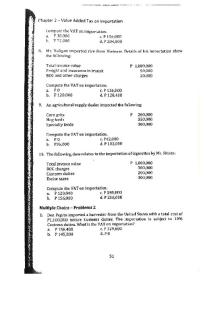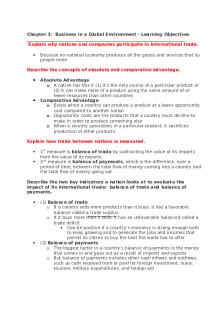The Adjusting Process - Lecture notes Chapter 3 PDF

| Title | The Adjusting Process - Lecture notes Chapter 3 |
|---|---|
| Course | Accounting Principles I |
| Institution | Borough of Manhattan Community College |
| Pages | 1 |
| File Size | 44.7 KB |
| File Type | |
| Total Downloads | 44 |
| Total Views | 135 |
Summary
Adjusting entries...
Description
Chapter 3: The Adjusting Process Accrual basis accounting - Revenues are earned when services are provided or goods are sold, regardless of when cash is received. Also expenses are recorded when incurred, regardless of when cash is paid. Cash basis accounting - Revenues are earned when cash is received for services provided or goods sold. Expenses are recorded when cash is paid. Cash Basis Accounting - Revenues are recorded when cash is received. - Expenses are recorded when cash is paid. - Not allowed under GAAP. - Easier method to follow; requires less knowledge of accounting concepts and principles. Time Period Concept - The time period concept assumes that business activities are sliced into small time segments and that financial statements can be prepared for specific periods, such as a month, quarter or year. Fiscal Year - Is an accounting year of any 12 consecutive months that may or may not coincide with the calendar year. Revenue Recognition Principle - When to record revenue. Matching Principle - Revenues are matched with expenses of a time period. Adjusting Entries 1. Purpose - To bring the accounts up to date 2. Consists of one income statement account and one balance sheet account 3. Cash is never used in an adjusting entry. Deferrals - Defer the recognition of revenue or expenses to a date after the cash is received or paid. - Two types of deferrals; Deferred expenses and deferred revenues. Accruals - Record an expense before the cash is paid, or records revenue before the cash is received. - Two types of accruals; Accrued expenses, and accrued revenue. Depreciation - Cost allocation (All property, plant, and equipment is subject to depreciation except land.)...
Similar Free PDFs

Chapter 3-The Adjusting Process
- 108 Pages

Lecture Notes 3-Adjusting entries
- 15 Pages

Adjusting Process - Accounting
- 59 Pages

Chapter 3 Lecture Notes
- 80 Pages

Lecture Notes Chapter #3
- 3 Pages

Chapter 3 Lecture Notes
- 4 Pages

Chapter 3 - lecture notes
- 38 Pages

Chapter 3 - Lecture notes 3
- 1 Pages

Chapter 3 - Lecture notes 3
- 30 Pages

Chapter 3 - Lecture notes 3
- 6 Pages

Chapter 3 - Lecture notes 3
- 6 Pages

Chapter 3 - Lecture notes 3
- 45 Pages

Chapter 3 - Lecture notes 3
- 4 Pages

Chapter 3 - Lecture notes 3
- 4 Pages

Chapter 3 - Lecture notes 3
- 3 Pages
Popular Institutions
- Tinajero National High School - Annex
- Politeknik Caltex Riau
- Yokohama City University
- SGT University
- University of Al-Qadisiyah
- Divine Word College of Vigan
- Techniek College Rotterdam
- Universidade de Santiago
- Universiti Teknologi MARA Cawangan Johor Kampus Pasir Gudang
- Poltekkes Kemenkes Yogyakarta
- Baguio City National High School
- Colegio san marcos
- preparatoria uno
- Centro de Bachillerato Tecnológico Industrial y de Servicios No. 107
- Dalian Maritime University
- Quang Trung Secondary School
- Colegio Tecnológico en Informática
- Corporación Regional de Educación Superior
- Grupo CEDVA
- Dar Al Uloom University
- Centro de Estudios Preuniversitarios de la Universidad Nacional de Ingeniería
- 上智大学
- Aakash International School, Nuna Majara
- San Felipe Neri Catholic School
- Kang Chiao International School - New Taipei City
- Misamis Occidental National High School
- Institución Educativa Escuela Normal Juan Ladrilleros
- Kolehiyo ng Pantukan
- Batanes State College
- Instituto Continental
- Sekolah Menengah Kejuruan Kesehatan Kaltara (Tarakan)
- Colegio de La Inmaculada Concepcion - Cebu
